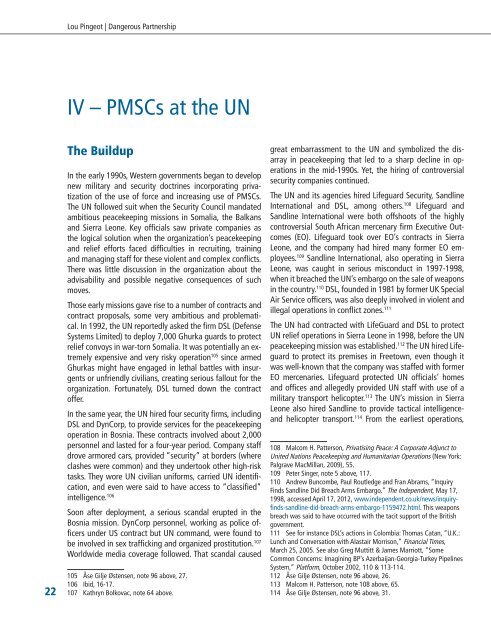Dangerous Partnership
Dangerous Partnership
Dangerous Partnership
Create successful ePaper yourself
Turn your PDF publications into a flip-book with our unique Google optimized e-Paper software.
22<br />
Lou Pingeot | <strong>Dangerous</strong> <strong>Partnership</strong><br />
IV – PMSCs at the UN<br />
The Buildup<br />
In the early 1990s, Western governments began to develop<br />
new military and security doctrines incorporating privatization<br />
of the use of force and increasing use of PMSCs.<br />
The UN followed suit when the Security Council mandated<br />
ambitious peacekeeping missions in Somalia, the Balkans<br />
and Sierra Leone. Key officials saw private companies as<br />
the logical solution when the organization’s peacekeeping<br />
and relief efforts faced difficulties in recruiting, training<br />
and managing staff for these violent and complex conflicts.<br />
There was little discussion in the organization about the<br />
advisability and possible negative consequences of such<br />
moves.<br />
Those early missions gave rise to a number of contracts and<br />
contract proposals, some very ambitious and problematical.<br />
In 1992, the UN reportedly asked the firm DSL (Defense<br />
Systems Limited) to deploy 7,000 Ghurka guards to protect<br />
relief convoys in war-torn Somalia. It was potentially an extremely<br />
expensive and very risky operation 105 since armed<br />
Ghurkas might have engaged in lethal battles with insurgents<br />
or unfriendly civilians, creating serious fallout for the<br />
organization. Fortunately, DSL turned down the contract<br />
offer.<br />
In the same year, the UN hired four security firms, including<br />
DSL and DynCorp, to provide services for the peacekeeping<br />
operation in Bosnia. These contracts involved about 2,000<br />
personnel and lasted for a four-year period. Company staff<br />
drove armored cars, provided “security” at borders (where<br />
clashes were common) and they undertook other high-risk<br />
tasks. They wore UN civilian uniforms, carried UN identification,<br />
and even were said to have access to “classified”<br />
intelligence. 106<br />
Soon after deployment, a serious scandal erupted in the<br />
Bosnia mission. DynCorp personnel, working as police officers<br />
under US contract but UN command, were found to<br />
be involved in sex trafficking and organized prostitution. 107<br />
Worldwide media coverage followed. That scandal caused<br />
105 Åse Gilje Østensen, note 96 above, 27.<br />
106 Ibid, 16-17.<br />
107 Kathryn Bolkovac, note 64 above.<br />
great embarrassment to the UN and symbolized the disarray<br />
in peacekeeping that led to a sharp decline in operations<br />
in the mid-1990s. Yet, the hiring of controversial<br />
security companies continued.<br />
The UN and its agencies hired Lifeguard Security, Sandline<br />
International and DSL, among others. 108 Lifeguard and<br />
Sandline International were both offshoots of the highly<br />
controversial South African mercenary firm Executive Outcomes<br />
(EO). Lifeguard took over EO’s contracts in Sierra<br />
Leone, and the company had hired many former EO employees.<br />
109 Sandline International, also operating in Sierra<br />
Leone, was caught in serious misconduct in 1997-1998,<br />
when it breached the UN’s embargo on the sale of weapons<br />
in the country. 110 DSL, founded in 1981 by former UK Special<br />
Air Service officers, was also deeply involved in violent and<br />
illegal operations in conflict zones. 111<br />
The UN had contracted with LifeGuard and DSL to protect<br />
UN relief operations in Sierra Leone in 1998, before the UN<br />
peacekeeping mission was established. 112 The UN hired Lifeguard<br />
to protect its premises in Freetown, even though it<br />
was well-known that the company was staffed with former<br />
EO mercenaries. Lifeguard protected UN officials’ homes<br />
and offices and allegedly provided UN staff with use of a<br />
military transport helicopter. 113 The UN’s mission in Sierra<br />
Leone also hired Sandline to provide tactical intelligenceand<br />
helicopter transport. 114 From the earliest operations,<br />
108 Malcom H. Patterson, Privatising Peace: A Corporate Adjunct to<br />
United Nations Peacekeeping and Humanitarian Operations (New York:<br />
Palgrave MacMillan, 2009), 55.<br />
109 Peter Singer, note 5 above, 117.<br />
110 Andrew Buncombe, Paul Routledge and Fran Abrams, “Inquiry<br />
Finds Sandline Did Breach Arms Embargo,” The Independent, May 17,<br />
1998, accessed April 17, 2012, www.independent.co.uk/news/inquiryfinds-sandline-did-breach-arms-embargo-1159472.html.<br />
This weapons<br />
breach was said to have occurred with the tacit support of the British<br />
government.<br />
111 See for instance DSL’s actions in Colombia: Thomas Catan, “U.K.:<br />
Lunch and Conversation with Alastair Morrison,” Financial Times,<br />
March 25, 2005. See also Greg Muttitt & James Marriott, “Some<br />
Common Concerns: Imagining BP’s Azerbaijan-Georgia-Turkey Pipelines<br />
System,” Platform, October 2002, 110 & 113-114.<br />
112 Åse Gilje Østensen, note 96 above, 26.<br />
113 Malcom H. Patterson, note 108 above, 65.<br />
114 Åse Gilje Østensen, note 96 above, 31.


